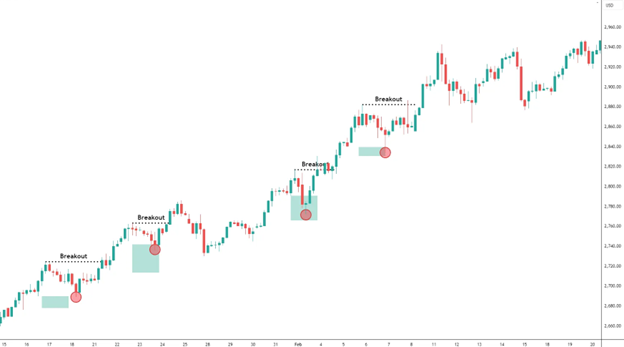
How to Swing Trade Gold (XAU/USD) Using Smart Money Concepts: A Simple Guide for Traders
 ACY Securities - Jasper Osita
ACY Securities - Jasper Osita
What This Guide Is About

Swing trading Gold isn’t the same as trading currency pairs. While many treat it like “just another chart,” Gold operates on its own logic—driven by fear, inflation, intermarket flows, and global liquidity shifts.
This guide walks you through how to approach Gold the simple way: using smart money concepts.
Whether you’re holding trades for a few days or managing positions around key zones, this will show you how to trade Gold with a checklist, lessening guess work.
Why Gold Is in the Spotlight

Gold isn’t just a shiny asset—it’s a global barometer for uncertainty, inflation, and faith in fiat currencies.
Here’s why traders across the world keep coming back to it:
- It reacts quickly to macro shifts—without needing a scheduled news event.
- It attracts safe-haven flows during geopolitical tension or risk-off sentiment.
- It performs well when real interest rates drop or central banks signal easing.
- It plays a psychological role in markets—investors still see it as a “store of value.”
Even in low-news weeks, Gold can deliver powerful moves just from liquidity positioning or sentiment shifts. That makes it a perfect market for swing traders who understand structure and timing.
What Actually Moves Gold?

Gold responds to a blend of macroeconomics and emotion. You don’t need constant news catalysts—what matters is, is it moving? Are the structures clear for a move on a certain direction?
Key Drivers Behind Gold’s Direction:
| Factor | How It Affects Gold |
|---|---|
| U.S. Dollar (DXY) | Tends to move inversely—when the dollar weakens, Gold often rises. |
| Real Interest Rates (e.g. US10Y minus inflation) | Lower real yields support Gold because holding it becomes more attractive. |
| Inflation Expectations | Rising inflation encourages investors to move into hard assets like Gold. |
| Risk Sentiment | In risk-off environments (e.g. war, recession fears), Gold usually rallies. |
| Geopolitical Events | Tension or uncertainty (e.g., conflicts, debt ceiling standoffs) can spike demand. |
| Central Bank Policies | Dovish signals often boost Gold, especially when real rates are falling. |
Gold is more reactive than Forex pairs but at the same trends more. It doesn’t need a clean economic narrative to move. Sometimes, all it takes is a shift in bond yields or a move in DXY—and Gold launches.
Swing Trading Gold vs. Swing Trading Forex

These are not the same game. If you approach Gold like a currency pair, you’ll likely get shaken out or misread key moves. Here’s how the two differ:
| Area | Forex (e.g. EUR/USD) | Gold (XAU/USD) |
|---|---|---|
| Market Nature | Currency pair, tied to relative economies | Commodity and safe haven |
| Behavior | Structured trends, lower volatility | Explosive, unpredictable, emotional |
| Catalysts | Interest rate changes, GDP, CPI | Fear, inflation expectations, global sentiment |
| Session Behavior | Peaks in London/NY overlaps | Spikes around NY open; traps common in Asia |
| Risk Profile | Easier to manage with tight stops | Needs breathing room—sharp moves are common |
| Best Opportunities | Macro-driven trends, policy divergence | Volatility spikes, liquidity sweeps, sentiment flips |
Gold often trades in bursts—compressing for days, then exploding in one direction. Forex tends to move in waves that follow policy cycles. Swing trading Gold requires more patience for the right moment—and enough room to let the trade breathe.
How to Build a Swing Trade Setup on Gold
This isn’t a one-size-fits-all system. But if you’re looking for a clear structure to work from, here’s a simple 5-step process to swing trade Gold:
Step 1: Start With the Macro Picture
Before you mark any zones, take 10 minutes to check:
- What’s DXY doing? Is it gaining or losing strength?
- Are real yields falling or rising?
- Is there global tension or calm?
- Where are we in the risk sentiment cycle. (Check this out how to identify risk-on & risk-off sentiment: How to Identify Risk-On and Risk-Off Market Sentiment: A Complete Trader’s Guide)
You want to build a narrative. Even if you don’t trade based on fundamentals, the story behind price matters. It sets the tone for everything else. The goal here is to determine whether Gold is poised to go up or down.
Step 2: Use the Daily Chart to Identify Liquidity Zones

Gold tends to respect long-term imbalances and liquidity pools. Use the weekly timeframe to:
- Define Market Structure (higher highs or lower lows?)
- Mark Support and Resistances
- Draw any large Fair Value Gaps for trade levels
- Spot external liquidity zones—previous major highs/lows
You’re not looking to trade off this chart—but it gives you a bird’s-eye view of where big players might be targeting.
The liquidity levels like Fair Value Gaps and Previous Week Highs / Lows can be traded at the Lower Timeframe.
Step 3: Drop to 4-Hour and Wait for Price to Reach the Daily Fair Value Gaps
On the 4-Hour chart:

- Look for a sweep of those levels—followed by rejection and momentum
You want to see Gold take out a level and trap traders. That’s your signal to prepare a setup—not jump in yet.
Step 4: Wait for a Breakout on 4-Hour
On the 4-hour chart, look for:

- A clean pullback into the zone
- A breakout after the sweep of the zone
If the reaction looks strong and price rebounds cleanly into a clear level and breaks out—that’s your entry window.
Step 5: Execute With a Swing Mindset


Following this concept, 4 out of 7 trades became a winner with a total of 2R loss and 21.46R win. Its like a 21.46% gain since January of 2025.
Gold isn’t a scalp. You’re aiming to hold for several days—possibly to the next round number or weekly level.
| Component | Example |
|---|---|
| Entry | Breakout after a Sweep of Daily Key Level |
| Stop Loss | Below the reaction zone or the sweep |
| Target | Next swing high or psychological level (e.g. $3,000) |
| Hold Time | Typically 2–5 days |
| Risk-Reward | Aim for 1:3 or better to justify swing exposure |
Let the trade play out. Avoid micromanaging unless something major changes in your narrative.
Mistakes to Avoid
- Trading without a macro bias—Gold punishes indecision
- Using stops that are too tight—random wicks will take you out
- Ignoring sentiment flips across other markets (DXY, yields, oil)
Swing trading Gold requires patience and conviction. You won’t get setups every day—but the ones that form tend to offer powerful moves when aligned properly.
🧭 Final Thoughts

Gold isn’t just another chart. It’s a global signal—a reflection of fear, faith, and flow. If you want to swing trade it successfully, look for confirmations using multi-timeframe analysis, use SMC for trade execution, use macros for directional bias.
Build your narrative. Wait for the trap. Confirm the shift. And enter with clarity.
"Gold doesn’t move just because of news—it moves because of fear, positioning, and timing. With these narratives, we can execute using technicals."
Check Out Our Market Education
How to Start Day Trading:
5 Steps to Start Day Trading: A Strategic Guide for Beginners
8 Steps How to Start Forex Day Trading in 2025: A Beginner’s Step-by-Step Guide
3 Steps to Build a Trading Routine for Consistency and Discipline - Day Trading Edition
Learn how to navigate yourself in times of turmoil:
How to Identify Risk-On and Risk-Off Market Sentiment: A Complete Trader’s Guide
How to Trade Risk-On and Risk-Off Sentiment — With Technical Confirmation
The Ultimate Guide to Understanding Market Trends and Price Action
Want to learn how to trade like the Smart Money?
Mastering the Market with Smart Money Concepts: 5 Strategic Approaches
Mastering Candlestick Pattern Analysis with the SMC Strategy for Day Trading
Understanding Liquidity Sweep: How Smart Money Trades Liquidity Zones in Forex, Gold, US Indices
The SMC Playbook Series Part 4: How to Confirm Trend Reversal & Direction using SMC
The SMC Playbook Series Part 5: The Power of Multi-Timeframe Analysis in Smart Money Concepts (SMC)
Trading Psychology and Continuous Improvement Contents:
The Mental Game of Execution - Debunking the Common Trading Psychology
5 Steps to Backtest a Trading Strategy with AI: A Step-by-Step Guide
Managing Trading Losses: Why You Can Be Wrong and Still Win Big in Trading
Follow me on LinkedIn: Jasper Osita
Join me in Discord: The Analyst Guild
This content may have been written by a third party. ACY makes no representation or warranty and assumes no liability as to the accuracy or completeness of the information provided, nor any loss arising from any investment based on a recommendation, forecast or other information supplies by any third-party. This content is information only, and does not constitute financial, investment or other advice on which you can rely.
LiquidityFinder
LiquidityFinder was created to take the friction out of the process of sourcing Business to Business (B2B) liquidity; to become the central reference point for liquidity in OTC electronic markets, and the means to access them. Our mission is to provide streamlined modern solutions and share valuable insight and knowledge that benefit our users.
If you would like to contribute to our website or wish to contact us, please click here or you can email us directly at press@liquidityfinder.com.
